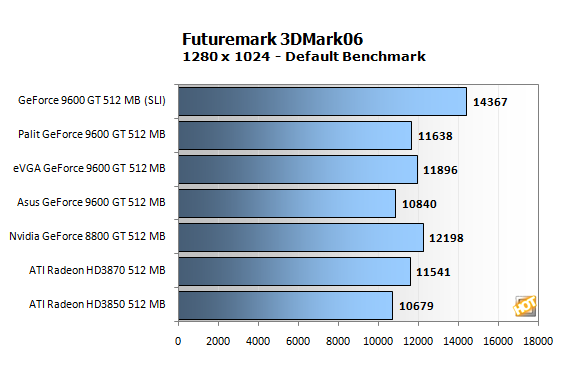 |
| Test System Details |
| Specifications and Revisions | |
- Intel Core 2 Exteme QX6750 (3.0 GHz Quad-Core, 65nm)
- eVGA Nvidia nForce 680i LT SLI Motherboard
- Kingston HyperX DDR2-800 Memory (4 x 1 GB, CAS 4-4-4-12)
- Western Digital Raptor 74 GB Hard Drive)
- Plextor PX-755SA DVD+/-RW Drive
- Corsair HX620W 620W Power Supply
- Microsoft Windows Vista Ultimate Edition (32-bit, SP1)
- Asus EN9600 GeForce 9600 GT 512 MB (650/1800)
- eVGA GeForce 9600 GT 512 MB SSC (740/1950)
- Palit GeForce 9600 GT 512 MB Sonic (700/2000)
- Nvidia GeForce 8800 GT 512 MB (600/1800)
- ATI Radeon HD3870 512 MB (775/2400)
- ATI Radeon HD3850 512 MB (735/1960)
- Nvidia Driver 169.25 (8800 GT)
- Nvidia Driver 174.12 (Beta, For 9600 GT Cards)
- ATI Catalyst 8.2 Driver
 |
| Synthetic Gaming |
| Futuremark 3DMark06 - Default Benchmark | |
 |
| Synthetic Gaming |
| Futuremark 3DMark06 - Shader Model 3.0 Performance | |

A couple of synthetic benchmarks to get things started, and we see that the GeForce 9600 GT performs just where NVIDIA wants it to. At stock reference clock speeds (Asus 9600 GT), the 9600 GT performs slightly better than a Radeon HD3850 but slightly below a GeForce 8800 GT. Our overclocked 9600 GT cards close the gap between the 9600 GT and 8800 GT lineup substantially, delivering nearly all of the 8800 GT’s performance, but at a lower price.

![]()







